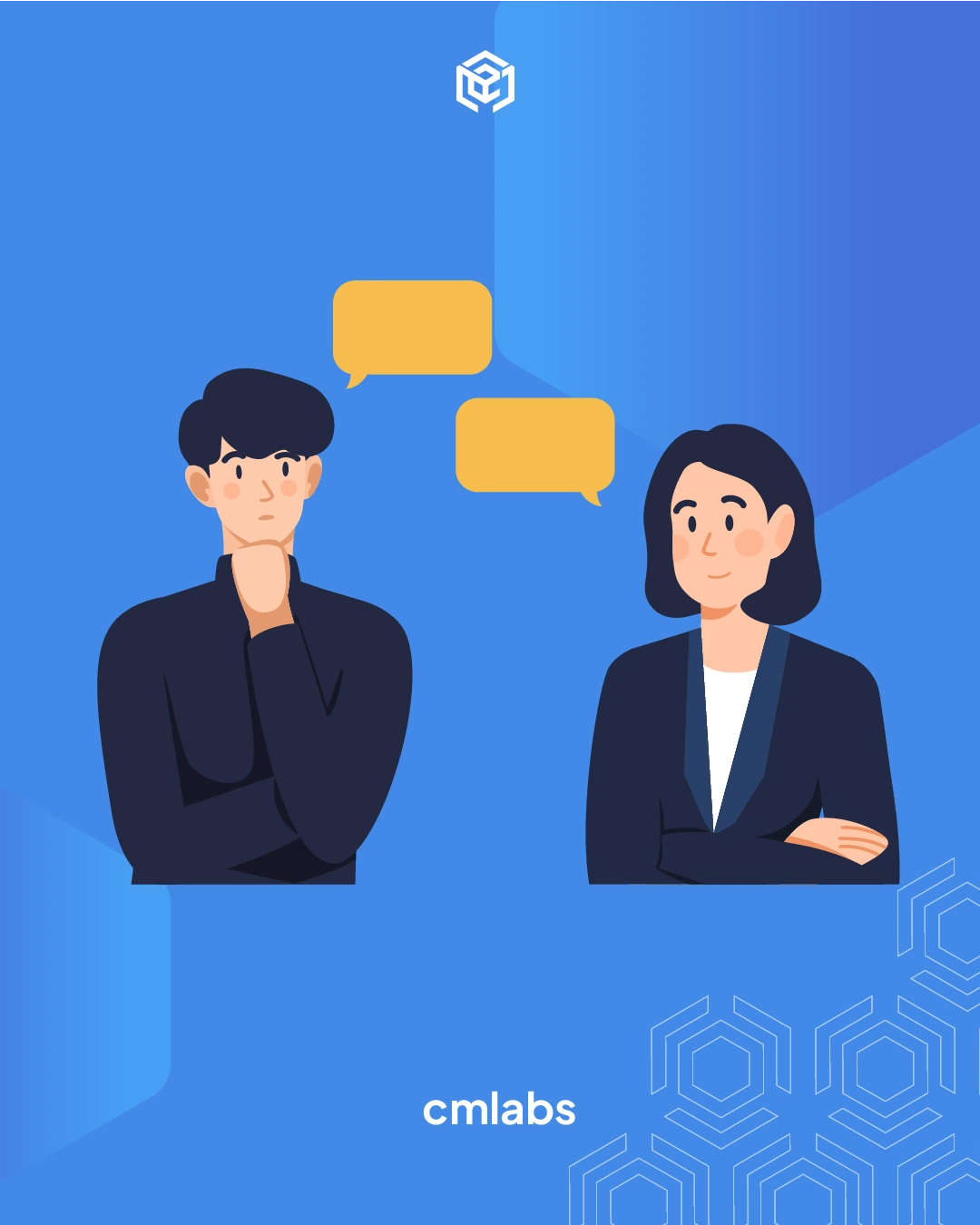We use cookies
This site uses cookies from cmlabs to deliver and enhance the quality of its services and to analyze traffic..
SEO SERVICES
Conduct in-depth technical website audits, strategically develop website projections, and increase your website authority.
ASO SERVICES
Elevate Your App’s Presence with Our Expert ASO Services – Boost Visibility and Drive Downloads!
WRITING SERVICES
We offer a variety of writing services to suit different business necessities. Reach broader audiences or lead specific industries? We've got you covered!
SEOlutions
A unified source of truth!
SEO & Digital Maternity Solution
SEO & Digital Maternity Solution: Leverage Cross-Platform Insights to Elevate Your Strategy with Expert Consultation
SEO & Digital Maternity Solution
Data Solution options:
Starting from Rp200 mio
Reinventing how a company get creative treatments
A new way to get your creative needs done. Agile team, efficient cost, and expedient way in a flexible yet scalable subscription plan!
Creative-as-a-Services
CaaS package options:
Based on Subscription
Pioneer in digital marketing software powerhouse
We’re excited to unveil our new range of Tech Solutions designed to drive your digital success. Whether you’re looking to enhance your website’s performance, streamline your tech stack, or unlock deeper insights from your data, we’ve got you covered.
Starting from Rp250 mio
Our Clients
Research and innovation center for digital transformation
Digital marketing combines technical skills and business knowledge at every stage. For marketing teams, improving budget management efficiency is crucial, as time is an invaluable resource that should be used wisely. At Sequence, we are dedicated to empowering you to optimize efficiency and strategic planning, ultimately enhancing the impact of your digital marketing efforts.
Subscription-based (IDR1,800/keyword)
Our Clients
BeyondSEO
References
SEO Tools for Webmasters
SEO Tools for Writers
SEO Tools
FIND THE SUITABLE PARTNERSHIP FOR YOUR COMPANY
Check out which cmlabs partnership program suits your company
WHITE LABEL SEO
for CorporateYour company is granted exclusive partnership rights to provide SEO services to our important clients, and we will provide a dedicated backend team to support your efforts.
AFFILIATE PROGRAM
for BizdevA new affiliate program is being introduced for skilled marketers and individuals with strong networks, offering commissions of up to 7% for generating profits independently.
DIGITAL AGENCY
for Marketing Partnerscmlabs is an essential partner for digital agencies, providing a unique selling proposition in Search Engine Optimization (SEO).
BACKLINK PARTNERSHIP
for Media / BloggerWe have a vast database of bloggers and media outlets across Indonesia, categorized by region and media type, giving our clients an edge in managing their media and SEO activities.
OFFICIAL TRAINING
We provide ongoing professional development and support to SEO professionals to ensure they are equipped to meet market demands.
JOIN AS CONTRIBUTOR
for Content WriterGreat opportunity for SEO Writers around the world. T&C applied!
ACADEMIC PARTNERSHIP
Through partnerships with universities in Indonesia, cmlabs has helped align academic curricula with industry demands.
Partnership
Sector & Industries
Tell us your SEO needs, our marketing team will help you find the best solution
As an alternative, you can schedule a conference call with our team
Schedule a Meeting?Contact
Survey
We use cookies
This site uses cookies from cmlabs to deliver and enhance the quality of its services and to analyze traffic..
Last updated: Sep 09, 2024
Optimization techniques known as Search Engine Optimization (SEO) are essential strategies for achieving high rankings on search engines.
As SEO becomes more important, lots of people are starting to learn the basics of SEO from different sources. However, not all of these sources are reliable and people often get the wrong idea which becomes a myth.
These myths are often unproven, misleading, and even may hurt your SEO efforts. To avoid being misled, you must know and avoid some common myths about SEO below.
One of the reason why your SEO strategy isn’t producing the expected result is maybe because you believe in SEO myths.
SEO myths can lead you to make poor decisions, ignore proven best practices, or even harm your overall website optimization.
To minimize misjudgments and slip-ups, you need to understand these common SEO myths. Here are some of the myths you should know:
Many people think conducting keyword research is unnecessary since it is enough to use common and popular keywords. However, in fact this is a big mistake.
Conducting keyword research is a critical step in an SEO strategy to improve your website's visibility and search engine rankings.
Keyword research will help you identify the words and phrases that you need to include so that your business website can reach the right target audience, increase traffic, and achieve higher conversion rates.
Without comprehensive research, you will likely use keywords that are less relevant, difficult to compete with, and have limited visibility. This, in turn, will potentially reduce the effectiveness of your Google optimization efforts.
Another common SEO myth is the belief that more keyword density equals higher ranking.
In fact, excessive keyword usage can lead to keyword stuffing, which goes against Google's guidelines. With that being said, this practice can negatively impact your site's ranking.
So, what is the correct strategy? Keywords should be incorporated naturally into your content and have a balanced density. Typically, keyword density should be around 0.5-1.0% of an article's total word count.
However, Google does not directly specify the exact keyword density to use, as its algorithms are completely proprietary.
It's a common misconception that SEO is all about focusing on keywords. However, please note that the quality of the content is important too.
Without high-quality, relevant, and useful content, search engines will not prioritize your content as they consider your content thin or lacks of information.
Aside from your content quality, Google also looks at user experience as a major factor in determining your website's ranking.
Therefore, to increase your site's ranking in Google searches, you need to ensure that your content excellent, your website runs smoothly and is easy to access, as well as contains engaging images and videos.
High-volume keywords are usually short phrases that get searched hundreds to millions of times a month. They can drive a lot of traffic, but because they're so competitive, they're not that specific to your niche.
While high-volume keywords can drive a lot of traffic, they are really competitive and not that specific to your niche.
To get high rankings, you shouldn't just focus on high-volume keywords. It's good to include other types of keywords, such as long-tail ones, which are easier to rank for.
Title tags and meta descriptions are the first things users see in search results. A lot of people think that these elements aren't that important and don't need much attention.
The truth is that search engines use these things to figure out how relevant your page is to the user's search. If you don't optimize them, search engines will have a hard time understanding your content.
Tips: Keep your title tag under 60 characters and your meta description under 160. It's also a good idea to include your targeted keywords in both.
Another SEO myth is that you should only create content occasionally, not too often. In reality, how often you create content is really important for Google optimization. To give your website a boost, try to create content regularly and consistently.
The logic is simple: the more content you create, the higher your website’s traffic and visibility you get.
However, avoid creating content haphazardly. To be recognized as an authority in your niche, you need to produce high-quality and relevant content for your target audience.
Watch out for agencies that claim they can get your website to the top ranking in no time. That's undoubtedly a myth.
When they make those promises, they often mean they're using black hat SEO techniques that break Google's rules.
SEO is a slow process, and you won't see results overnight. To get those high rankings, you've got to be patient and stick to a consistent strategy.
Instead of choosing an agency that promises quick results, go with a professional SEO company that has experts with lots of experience.
Another SEO myth is the belief that having as many backlinks as possible will lead to higher rankings. It's important to remember that not all backlinks positively impact your optimization efforts.
Backlinks from untrusted sites can actually harm your website’s credibility. A large number of untrusted or spammy links can make Google suspicious that you are buying links, which can result in penalties for your site.
It's a common mistake among business owners to think that longer content will automatically get better search rankings.
The quality of a piece of content isn't determined by its length alone, but also by how it's put together, how well it communicates, the relevance and credibility of the information, and the way it uses keywords.
Another thing people often get wrong about SEO is that they think it's a one-time strategy. This misunderstanding can harm your website's optimization. To get good results from SEO, you've got to put in ongoing efforts and strategies.
It usually takes a few weeks or months to see results from SEO strategies in organic SEO.
But the good news is that, although SEO takes time to implement, the results you get from Google optimization will be long-lasting and sustainable for your business.
Sometimes, we all set our sights high, hoping for a top ranking for our targeted keywords. While getting to the top of the rankings is a key goal of SEO, it would be hard to wish that all pages on your site will achieve first rank.
Some people think that if they don't make it to number one, they've failed at SEO, but that's not really the case. Instead of seeing it as a failure, you might need to make some tweaks to your website or run a few more campaigns.
Sometimes, competitors have more relevant content than yours, which is normal. The key is to keep on top of your SEO practices, checking in to see what's working and what isn't.
The last myth is that the technical parts of a website don't affect its ranking. That's not true.
In reality, technical factors like page loading speed, URL structure, and using HTML tags correctly have a big impact on search engine rankings.
If there are still some technical issues, search engines might not be able to index and crawl your site as effectively, which could then affect your rankings.
WDYT, you like my article?
Couldn't find result for "Mulki" try to search with different keyword
Suggestion:
Tell us your SEO needs, our marketing team will help you find the best solution
As an alternative, you can schedule a conference call with our team
Schedule a Meeting?



cmlabs Jakarta Jl. Pluit Kencana Raya No.63, Pluit, Penjaringan, Jakarta Utara, DKI Jakarta, 14450, Indonesia
(+62) 21-666-04470These strategic alliances allow us to offer our clients a wider range of SEO innovative solutions and exceptional service.

Psst! Hey there, SEO Stats and Tools SEO company! If you've ever planned of conquering the Singapore market, you've come to the right place!